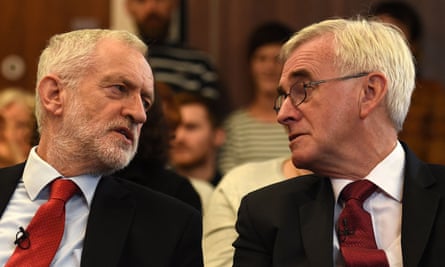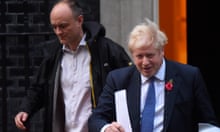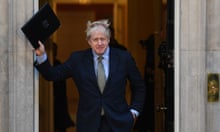We can skip the first stage of grief. A result like this leaves no room for denial. Let’s move instead to the next stage: anger. We can feel a deep and bitter fury at what five more years of Boris Johnson will mean – at what his government, armed with such a mandate, will do. It will allow him to pursue a hard Brexit, to cosy up to Donald Trump and to trample on our democratic norms and judicial restraints. It will risk the union. It will allow him to ignore the poorest and most vulnerable, the children going to school hungry, to abandon the people whose lives and communities have been made thin by a lost decade of austerity and shrunken services – a decade that will now stretch, like a prison sentence, to 15 years.
We can be angry at the Tories for winning this election, but we must feel an equal rage for the people who let them do it. I am speaking of those who led the main party of opposition down a blind alley that ended in Labour’s worst election performance since the 1930s – a performance that broke new records for failure. Look upon the scale of that calamity: to lose seats to a government in power for nine lean years, a government seeking a fourth term that is almost never granted, a cruel government so divided it purged two former chancellors and some of its best-known MPs, led by a documented liar and fraud. A half-functioning opposition party would have wiped the floor with this Tory party. Instead, Labour was crushed by it.
The leadership’s defenders wasted no time in blaming it all on Brexit. To be sure, Brexit has convulsed our politics and made Labour’s electoral coalition perilously hard to hold together. But pause before declaring that this was the Brexit election: in fact, the NHS overtook Brexit as voters’ top concern. The trouble was, voters trusted Johnson on the NHS more than they trusted Jeremy Corbyn. You read that right.
Which brings us to a core point that those culpable for this disaster would rather you didn’t contemplate. Like anyone who travelled the country and listened to voters, candidates and canvassers, I heard with my own ears the Labour voters who said they couldn’t back the party this time, not because of Brexit but because of Corbyn. Indeed, Brexit was often cited not for its own sake – little of this campaign was spent debating customs zones and trade agreements – but rather for its confirmation of their view that Corbyn was irredeemably “weak”.
This problem did not wait until the election to reveal itself. The polling data was clear and voluminous on this point long before the election. Corbyn is the most unpopular opposition leader since records began. And though we may not like it, we know that voters’ assessment of the party leaders plays a huge part in their decision.
Labour knew it and Corbyn knew it. Those appalling numbers were not state secrets. His admirers always describe him as a selfless, almost saintly man, devoid of ego. So why didn’t he take one look at his own ratings and say, “I am clearly a drag on this party’s prospects. Those who need a Labour government have a better chance of getting one if I step aside.” Not a chance.
Corbyn’s own vanity was too great for him even to consider such an act of self-sacrifice. Instead he was encouraged by his own devoted legions of supporters, for whom the idea of a change of leader was heresy. In their mind, it was better to lose under Corbyn than to have a shot at winning with someone – anyone – else.
Perhaps it was too much to ask that he make way for a candidate less sure to repel the electorate. But he made this a presidential campaign, his face everywhere, other Labour heavyweights banished from the airwaves. In their place were factionally approved nodding dogs such as Richard Burgon. Never mind that they were bound to be useless, what mattered was that they were loyal to the ruling clique.

Of course, this relates not just to Corbyn but Corbynism. For the last four years, Labour has been in thrall to the notion that it’s better to have a manifesto you can feel proud of, a programme that calls itself radical, than to devise one that might have a chance of winning. Some even argued that, “win or lose”, Corbyn achieved much simply by offering a genuinely socialist plan – in contrast with Labour’s 1997 offer, which was so boringly modest and incremental.
Well, guess what. Labour’s “radical” manifesto of 2019 achieved precisely nothing. Not one proposal in it will be implemented, not one pound in it will be spent. It is worthless. And if judged not by the academic standard of “expanding the discourse”, but by the hard, practical measure of improving actual people’s actual lives, those hate figures of Corbynism – Tony Blair and Gordon Brown – achieved more in four hours than Corbyn achieved in four years. Why? Because they did what it took to win power.
That’s what a political party is for. It’s not a hobby; it’s not a pressure group that exists to open the Overton window a little wider; it’s not an association for making friends or hosting stimulating conversations and seminars; it’s not “a 30-year project”. Its purpose is to win and exercise power in the here and now. It is either a plausible vehicle for government or it is nothing.
That was beyond the reach of the faction ruling Labour. Not for them the electoral basics of reassurance and credibility. They came up with a manifesto more stuffed with giveaways than Santa’s grotto, and about as believable. The voter who quite liked the extra sugar in their tea represented by, say, free tuition fees, gagged when the sweetener of discounted rail fares, Waspi compensation, free broadband and a promised £6,700 a year to every family were all spooned into the cup.
Labour’s ruling elite forgot that parties of the left are held to a higher standard than those committed to the status quo: to change people’s lives and spend their money, first you must win their trust. That obligation is even spelled out in Labour’s constitution, which insists that “Labour seeks the trust of the people to govern.” Instead, the leadership clique dragged around their 1970s baggage and arcane ideological obsessions – the antisemitism arose not by accident, but as the inevitable outgrowth of a strain of left conspiracist thinking – that marked them out as cranks, unfit to run the country.
To warn of this danger and sound the alarm was to be instantly howled down as a Blairite, a centrist, a red Tory. On social media, a group of outriders policed the conversation, unleashing a pile-on of mockery and denunciation on anyone guilty of pointing out that the emperor seemed to be unnervingly lacking in clothes. (Then they affected surprise when those they’d told to “fuck off and join the Tories” didn’t come running to help.)
The tragedy of this is measured in the idealistic young volunteers who signed up for a new and necessary movement in 2015, but whose faith was abused by a clique of hard-left sectarian dinosaurs – and, most important, it is measured in the millions who needed a social democratic government and now won’t get one.
The question now is, how long will it take to draw the obvious conclusion? You might have thought that the experience of the 1980s – four defeats in a row, followed by a march towards electability – had been education enough. We’d seen this movie before but, it seems, we needed to see it all over again.
We’ll have a clue whether it’ll take a fifth – or sixth – defeat for the penny to drop when Labour selects a new leader. Will it look for someone who ticks all the ideological boxes, who’s as sound and “radical” as Corbyn, or will it look for someone who can win?
Underneath that is a larger question: are you in politics to control the Labour party, or to win power? If the honest answer is the former, then get out of the way. Go back to your student unions and your pub meetings and give Labour back to those who seek the power of government – and are fit to wield it.











